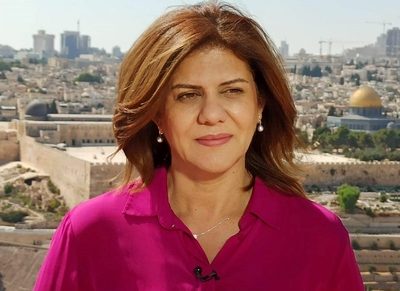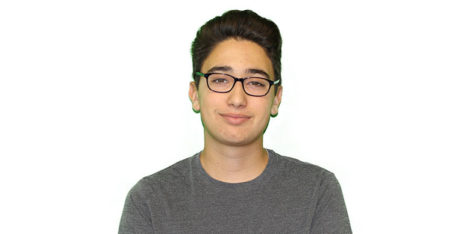On the evening of Wednesday, May 11, Shireen Abu Akleh, a Palestinian-American woman, was shot and killed by an Israeli soldier.
In their press statements, the Israeli government frequently justifies the killing of Palestinian men, women, and children by accusing them of throwing stones, yelling provocative statements, or supposedly living in close proximity to a weapons storage facility. However, the Israeli government could not use these excuses to justify Abu Akleh’s murder.
Shireen Abu Akleh was one of the Arab world’s most prominent journalists- a writer and reporter on Al Jazeera for 25 years. Although clearly marked in her press vest and press helmet, she was shot in the head while reporting on the Israeli raid of a Palestinian refugee camp in the city of Jenin. After Abu Akleh fell to the ground, her producer was shot, putting him in critical condition, and others who rushed to her body were also shot at.
Abu Akleh was born in occupied Jerusalem in 1971. She often spoke of how her experiences growing up in a segregated area under heavy military control inspired her to choose her career path. She studied architecture and hated it, instead falling in love with journalism as a means of telling the stories of Palestinians who were forcefully removed from their homes by Israeli settlers. She reported on the ethnic cleansing of Palestinians by using detailed, emotional testimonies–a journalistic style that is rarely used for that topic. Abu Akleh was hired as a reporter for Al Jazeera and became a recognizable voice for two and a half decades.
“I chose journalism to be close to people. It may not be easy to change the reality, but at least I was able to make that voice heard in the world,” Akleh told Al Jazeera.
The killing of Abu Akleh is not the first of its kind. It follows a pattern of assassinations and disappearances of prominent anti-occupation voices committed by the Israeli military. Abu Akleh is the fifty-fifth journalist to be assassinated by Israel since 2000.
Palestinian writer Mariam Barghouti shared her experiences with the pattern.
“I remember vividly when I realized that wearing a press vest in Palestine has been stripped of its protective purpose. I haven’t worn my vest in what seems like an era,” Barghouti said in an Instagram post. “At some point, you realize perhaps not wearing one meant you aren’t as visible to the soldiers. Or perhaps it would mean, at least, you’re not a walking target.”
The murder itself was only part of the campaign to target Abu Akleh and the Palestinian right to free speech. Two days after the shooting, the Israeli armed forces brutally attacked her funeral procession with stun grenades, tear gas, and batons.
Footage obtained by Al Jazeera shows police beating Omar Abu Khdeir in the head and legs. Abu Khdeir, nicknamed “The Coffin Protector” by viewers of the video, nearly dropped the coffin as he lifted up one arm to protect his head from the attack. Abu Khdeir was then arrested and charged with membership of a terrorist organization, providing services to it, and planning terrorist acts in Jerusalem. All the charges have been proven false. His only crime was being a pallbearer to a prominent voice of Palestine.
Mohamed Moawed, the managing editor for Al Jazeera’s Arabic channel, reported on the live footage stating, “I’ve reported on news around the world for decades, and I’ve never seen a scene like this. Attacking innocent people carrying the casket? I don’t know what to say anymore. What are they expecting now? How is that a security threat to anyone? Why does this require that level of violence and suppression on the part of the Israelis?”
By the time the story reached Western media, Mowed’s angle was erased. The most viewed articles include the headlines “Shireen Abu Akleh, Palestinian Journalist, Dies, Aged 51” by The New York Times, “Breaking News: Israel calling for an investigation after an Al Jazeera reporter was shot and killed today” by CBC, and, “Shireen Abu Akleh, a journalist for the Al Jazeera network, was killed by gunfire in the occupied West Bank, the Palestinian Health Ministry says,” by The Associated Press.
These three articles, among others by ABC, CBS, and CNN, have something in common. They don’t even name Israel, let alone place accountability on them for deliberately committing a human rights violation of freedom of speech and press.
A double standard is made clear in comparison to articles about Ukraine. When Russian journalist Oksana Baulina was killed in Kyiv, The Guardian wrote, “Russian reporter killed in Kyiv shelling is fifth to die in conflict.” On Abu Akleh, The Guardian reported, “Al Jazeera accuses Israeli forces of killing a journalist in West Bank.” The Guardian goes so far as to delegitimize the assassination, leaving it up for debate.
As I further researched the Western perspective on Abu Akleh’s murder, I asked, “What if Barbara Walters or Anderson Cooper were shot in the head and killed while reporting on the National Guard’s raid of Standing Rock, North Dakota in 2016? What side of the double standard would Western media outlets be on? Would we see the headline, ‘CNN demands answers after death of US journalist’? Or would there be international outrage and a demand for accountability on the National Guard and US government?”
The attack on mourners was caught on camera by Al Jazeera, yet western media reported that “clashes erupted.” The delegitimization of the assassination and one-sided already caused severe implications.
Israeli military spokesperson Ran Kochav said, “They’re armed with cameras if you’ll permit me to say so.” Itamar Ben-Gvir, a member of the Knesset (Israeli parliament), said. “I fully support IDF soldiers. Al Jazeera correspondents have used to obstruct their work by intentionally standing in the middle of the battlefield.”
On May 19, the Israeli government announced that they dropped their investigation into the Israeli soldiers who shot Abu Akleh. American and European journalists and reporters spread false information and decades-old racist biases and in doing so, served as accomplices to the Israeli evasion of accountability.
Instead of quoting Al Jazeera, CNN initially quoted the Israeli Defense Forces, saying Abu Akleh was shot by Palestinian gunmen. The IDF’s aerial footage revealed the gunmen were on the opposite side of the refugee camp, never once coming close to the press. By clearing the IDF of any responsibility, CNN blamed Abu Akleh for her own death and validated a racist trope that Palestinians commit violence blindly.
By not mentioning Israel’s responsibility for the shooting, the other media outlets assisted the Israeli government in dropping their investigation by concluding that Abu Akleh had died in the crossfire, as opposed to a premeditated assassination. The scenes of thousands of Muslims and Christians, Imams and Catholic and Orthodox priests, all praying together to honor Abu Akleh, were ignored in favor of the trope that Palestinians are in conflict with each other. Instead, the outlets frequently claimed that Palestinians provoked Israeli armed forces with rocks, a claim that was repeatedly proven false.
Abu Akleh will live on as an icon of journalism and conflict reporting. The day after she was pronounced dead, three Palestinian families named their baby girls Shireen in her honor. Her commitment to telling authentic stories played an influential role in uniting Palestinians in their struggle for freedom. Her sing-off, which used to be mocked by Israeli soldiers over loudspeakers, remains ingrained in the minds of millions of viewers.












